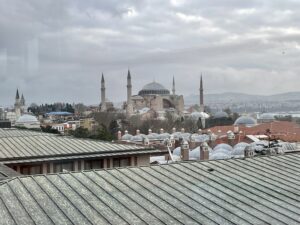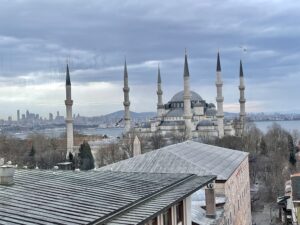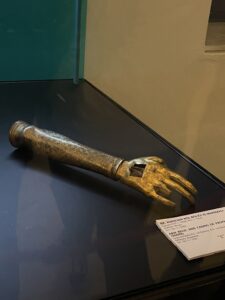
In 2016, Peg and I were signed up for a Danube River Cruise that included a right turn off the Danube and a flight south for three days in Istanbul, Turkey. Because there was unrest in Turkey in 2016 Americans were advised to avoid Istanbul until things calmed. Being raised during the 1940’s to the 1960’s we heeded our government’s advice. We had already visited Amsterdam, Vienna, Slovakia, Hungary, Croatia, Serbia, Bulgaria and Romania and other ports of call, but we always regretted not getting to Istanbul, the one-time Constantinople and capitol of the Holy Roman Empire. We finally joined the Ottomans, Greeks, Romans, Byzantines, British, etc., etc. and landed in Istanbul for a week in January, 2023.

We woke up early for breakfast and were amazed to have our morning coffee only a few hundred yards away from the fabled Blue Mosque, Hagia Sophia Mosque and the ancient Hippodrome where Constantine and his Roman soldiers raced chariots almost 2,000 years before we arrived. Since we are Americans and, as the great French sociologist Alexis de Tocqueville noted in 1835, we always eat breakfast much too early, we had the sixth floor dining room all to ourselves at 7:00 a.m. We had our choice of any large window looking through the morning mist at much of the history that eventually made the revelations of Christianity and later Islam the dynamic forces they became. It was an exciting and intriguing panorama. We could not wait to finish our non-bacon breakfast and go walk where Constantine and so many others had.
We hired a guide even though the Turkish people were not only open and friendly, but also generally able and willing to speak English and help assist us in our quest to experience great architecture and artifacts. We were impressed that both the marvelous Blue Mosque with its glittering blue mosaic tiles and the even more overpowering Hagia Sophia Mosque were open for free to any member of the public without regard to faith or lack thereof. At the Blue Mosque they had a free lecture on Islam and gave any visitor who wanted one a copy of the Quran in any language one chose. Peg and I accepted one in English to replace the one we had been given at an open house at the mosque in Evansville, Indiana in 2005 that had somehow been misplaced in our moves. Although Peg and I were both raised Christian we thought we should at least know something about another faith practiced by over 1/4 of the world’s population. I have, also, donned a yarmulke and accepted invitations to synagogues and Peg lived in a Jewish neighborhood when she was a child. I have not found either the Islamic or Judaic experiences to be harmful or the Christian one either for that matter.

Anyway, after being amazed by the Roman columns and fortresses, the aqueduct and especially the gigantic fresh water Roman cistern carved out of the solid rock beneath Istanbul, we visited one more religious relic that, whether genuine or apocryphal, truly astounded us. In a museum attached to the Sultan’s Palace was a glass case protecting what was claimed to be the bones of the forearm and hand of John the Baptist brought back from the Holy Land by the Sultan. Whether in truth or myth, it was still inspiring to be close to a hand that baptized Jesus. Now, even a skeptic such as I had to suspend analysis for awe by that sight only two feet away.
Later that week we took a boat cruise on the Straights of the Bosphorus and sailed from Europe to Asia then back again. The world map showed we were extremely close to two of the great battlefields of history, Gallipoli and Troy. To think we were riding on the same waters as thousands of Australians and Turkish soldiers who struggled in that great WWI slaughter and also where one of my childhood classic heroes from the Iliad, Achilles, helped bring down “the topless towers of Ilium” was worth every inconvenience and the six year wait since our first attempt to “conquer” Istanbul.
I urge you, Gentle Reader, to follow the steps of those who did so much to make us who we are. They may be gone but you will never forget them for helping to make us, us.
Leave a Reply